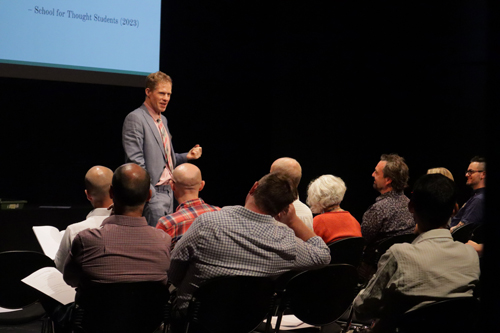
Your complimentary articles
You’ve read one of your four complimentary articles for this month.
You can read four articles free per month. To have complete access to the thousands of philosophy articles on this site, please
Report
The Association of Philosophy Teachers Conference Report
Paul Moore-Bridger reports from an exciting new frontier for philosophy.
The Association of Philosophy Teachers (APT) held its inaugural annual conference at King Edward’s School, Birmingham on Monday 26th June 2023. The idea for a national association of philosophy teachers arose out of a series of lockdown-era video calls in 2020 between one Paul Moore-Bridger, Head of Philosophy at King Edward’s School and Meena Dhanda of Wolverhampton University. It may well never have seen the light of day after this lengthy period of gestation but for the skilful midwifery of Simon Kirchin, energetic organisational genius and Director of the British Philosophical Association and the generous support of the Royal Institute of Philosophy, the publisher Who the Hell is…? and this very magazine, Philosophy Now.
Delegates gathered from around the country to hear a typically impassioned appeal on behalf of philosophy in schools from Sheffield University’s Professor Angie Hobbs, perhaps the discipline’s best-known champion in the UK. She took her cue from Jane Gatley’s recently published book Why Teach Philosophy in Schools? (Bloomsbury 2023), which argues for philosophy’s position in the statutory curriculum due to its ability to help people think clearly about everyday concepts. Angie developed a much broader justification, focusing on the subject’s ability to deliver a whole range of epistemic, ethical and civic benefits should an enlightened government give it a place in the statutory curriculum.

The stuff of nightmares… a classroom full of teachers! APT Conference 2023
Suitably fired-up – though in truth the audience hadn’t needed much convincing – the delegates went off to participate in workshops delivered by teachers, academics, Philosophy For Children practitioners and exam board representatives on how to turn conviction into reality. Sessions covered such topics as decolonising the philosophy syllabus; teaching about conspiracy theories; the effective altruism movement; delivering a pure philosophy course at Key Stage 3; and how to integrate techniques from Philosophy For Children (P4C) and Philosophy With Children (PWC) into regular classroom practice. Representatives from the various exam boards – International Baccalaureate, OCR, AQA and Pearson – were on hand to field questions about their boards’ qualifications.
The workshops were all excellent, but a conference is about so much more than what is delivered by the speakers. What really mattered for the future of APT was to have the opportunity to gather together to generate a sense of community. So often the life of the philosophy teacher is a solitary one; acting as small adjuncts to the Religious Education departments or holding down insecure part-time roles in institutions that accord our subject marginal status. It is easy to feel isolated and misunderstood. Yet, as all of us who have some stake in the teaching of philosophy know, it has the potential to transform the lives of those students lucky enough to encounter one of those small pockets of philosophy existing out there in the educational wilderness. It is so often the cause of or catalyst to an intellectual awakening of the kind that Angie glowingly described in her keynote speech.
The final session of the conference provided an apt (sorry!) finale. Before the assembled throng of eighty or so philosophy practitioners and well-wishers left, Simon Kirchin and I appealed for volunteers to help the fledgling Association of Philosophy Teachers take wing. Our call was for people to selflessly give up their time to do the unglamorous administrative work necessary to establish our legal status, the necessary precursor to the kinds of collective action that inspired the foundation of the association in the first place. After a stirring call from the floor from Meena Dhanda appealing to delegates to do their duty for APT’s cause (she later confided that philosophers were particularly vulnerable to such appeals), a host of colleagues came forward to offer their services. Thus the conference ended on a hugely optimistic note, with delegates going back to their schools, universities and places of work with a deepened sense of community and collective purpose.
If you would like to get involved with the Association of Philosophy Teachers, then please email admin@bpa.ac.uk to be added to our mailing list and visit APT’s pages at the BPA’s website where you can find resources from the conference. You will also find contact details for Simon Kirchin and DaN McKee there: they are always happy to hear from people who would like to be part of philosophy’s future!
Other associations of philosophy teachers around the world
APT is the UK’s first organisation for secondary school philosophy teachers, but equivalent organisations have existed elsewhere for a while. They include (among others):
• Ontario Philosophy Teachers’ Association (OPTA) sites.google.com/view/ontariophilosophy
• Federation of Asia-Pacific Philosophy in Schools Associations fapsa.org.au
FAPSA promotes philosophy in schools in Australia, New Zealand, India, Hong Kong and Singapore. Its member organisations include:
• Victorian Association for Philosophy in Schools (VAPS) www.vaps.vic.edu.au
• South Australian Philosophy in Education Association (SAPEA) sapea.net
• New Zealand Association for Philosophy Teachers nzapt.net
In the USA the American Association of Philosophy Teachers (philosophyteachers.org) includes teachers both from universities and from high schools, while PLATO focuses on pre-college philosophy.









